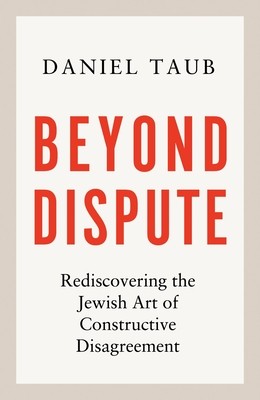
- We will send in 10–14 business days.
- Author: Daniel Taub
- Publisher: Hodder Faith
- ISBN-10: 1399815067
- ISBN-13: 9781399815062
- Format: 15 x 23.6 x 2.5 cm, kieti viršeliai
- Language: English
- SAVE -10% with code: EXTRA
Reviews
Description
In a world of increasingly fractious debate and seemingly irreconcilable differences, whether at the level of public political discourse or in the much-reported culture wars, this book makes an unheard case for argument as a force for good.
Daniel Taub was a lead negotiator in the Israel-Palestine peace process and then served as Israel's ambassador to the UK, and in this new book he pulls together telling insights from being at the table for some of the world's most fraught negotiations, applied hints and tips from the lectures and Difficult Conversations labs he now presents at universities and businesses in Israel, the US and the UK. This is all underpinned by a deep understanding of Jewish thought which, he argues, holds the key to a completely different understanding of how a good argument should develop the thinking of all those involved, and can lead to harmony rather than discord. This is an intriguing popular non-fiction title with much for all of us to learn from Daniel's diplomatic and political insights, his negotiation techniques, and from his repackaging of ancient wisdom presented in a readily comprehensible form. Comparisons include Jonathan Haidt, Simon Sinek, David Brooks.EXTRA 10 % discount with code: EXTRA
The promotion ends in 23d.22:42:13
The discount code is valid when purchasing from 10 €. Discounts do not stack.
- Author: Daniel Taub
- Publisher: Hodder Faith
- ISBN-10: 1399815067
- ISBN-13: 9781399815062
- Format: 15 x 23.6 x 2.5 cm, kieti viršeliai
- Language: English English
In a world of increasingly fractious debate and seemingly irreconcilable differences, whether at the level of public political discourse or in the much-reported culture wars, this book makes an unheard case for argument as a force for good.
Daniel Taub was a lead negotiator in the Israel-Palestine peace process and then served as Israel's ambassador to the UK, and in this new book he pulls together telling insights from being at the table for some of the world's most fraught negotiations, applied hints and tips from the lectures and Difficult Conversations labs he now presents at universities and businesses in Israel, the US and the UK. This is all underpinned by a deep understanding of Jewish thought which, he argues, holds the key to a completely different understanding of how a good argument should develop the thinking of all those involved, and can lead to harmony rather than discord. This is an intriguing popular non-fiction title with much for all of us to learn from Daniel's diplomatic and political insights, his negotiation techniques, and from his repackaging of ancient wisdom presented in a readily comprehensible form. Comparisons include Jonathan Haidt, Simon Sinek, David Brooks.

Reviews